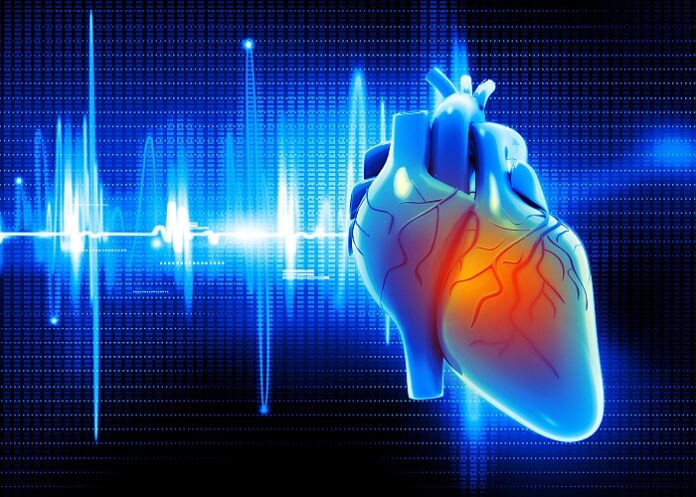Among patients with stable coronary heart disease, the presence of mental stress–induced ischaemia was significantly associated with an increased risk of cardiovascular death or non-fatal myocardial infarction.
The pooled analysis (published in JAMA Network) of two prospective cohort studies that included 918 participants found that presence of ischaemia with mental stress, compared with no ischaemia with mental stress, was significantly associated with an increased risk of cardiovascular death or nonfatal myocardial infarction, Mental stress–induced myocardial ischaemia was significantly associated with an increased risk of cardiovascular events in patients with coronary heart disease, but further research is needed to assess whether testing for mental-stress ischaemia has utility in clinical practice.
Study details
Association of Mental Stress–Induced Myocardial Ischemia With Cardiovascular Events in Patients With Coronary Heart Disease
Viola Vaccarino, Zakaria Almuwaqqat, Jeong Hwan Kim, Muhammad Hammadah, Amit J. Shah, Yi-An Ko, Lisa Elon, Samaah Sullivan, Anish Shah, Ayman Alkhoder, Bruno B. Lima, Brad Pearce, Laura Ward, Michael Kutner, Yingtian Hu, Tené T. Lewis, Ernest V. Garcia, Jonathon Nye, David S. Sheps, Paolo Raggi, J. Douglas Bremner, Arshed A. Quyyumi
Published in JAMA on 9 November 2021
Abstract
Mental stress–induced myocardial ischemia is a recognised phenomenon in patients with coronary heart disease (CHD), but its clinical significance in the contemporary clinical era has not been investigated.
Objective
To compare the association of mental stress–induced or conventional stress–induced ischemia with adverse cardiovascular events in patients with CHD.
Design, setting and participants
Pooled analysis of two prospective cohort studies of patients with stable CHD from a university-based hospital network in Atlanta, Georgia: the Mental Stress Ischemia Prognosis Study (MIPS) and the Myocardial Infarction and Mental Stress Study 2
(MIMS2). Participants were enrolled between June 2011 and March 2016 (last follow-up, February 2020).
Exposures
Provocation of myocardial ischemia with a standardised mental stress test (public speaking task) and with a conventional (exercise or pharmacological) stress test, using single-photon emission computed tomography.
Main outcomes and measures
The primary outcome was a composite of cardiovascular death or first or recurrent non-fatal myocardial infarction. The secondary end point additionally included hospitalisations for heart failure.
Results
Of the 918 patients in the total sample pool (mean age, 60 years; 34% women), 618 participated in MIPS and 300 in MIMS. Of those, 147 patients (16%) had mental stress–induced ischemia, 281 (31%) conventional stress ischemia, and 96 (10%) had both. Over a five-year median follow-up, the primary end point occurred in 156 participants. The pooled event rate was 6.9 per 100 patient-years among patients with and 2.6 per 100 patient-years among patients without mental stress–induced ischemia. The multivariable adjusted hazard ratio (HR) for patients with vs those without mental stress–induced ischemia was 2.5 (95% CI, 1.8-3.5).
Compared with patients with no ischemia (event rate, 2.3 per 100 patient- years), patients with mental stress–induced ischemia alone had a significantly increased risk (event rate, 4.8 per 100 patient-years; HR, 2.0; 95% CI, 1.1-3.7) as did patients with both mental stress ischemia and conventional stress ischemia (event rate, 8.1 per 100 patient-years; HR, 3.8; 95% CI, 2.6-5.6).
Patients with conventional stress ischemia alone did not have a significantly increased risk (event rate, 3.1 per 100 patient- years; HR, 1.4; 95% CI, 0.9-2.1). Patients with both mental stress ischemia and conventional stress ischemia had an elevated risk compared with patients with conventional stress ischemia alone (HR, 2.7; 95% CI, 1.7- 4.3). The secondary end point occurred in 319 participants. The event rate was 12.6 per 100 patient-years for patients with and 5.6 per 100 patient-years for patients without mental stress–induced ischemia (adjusted HR, 2.0; 95% CI, 1.5-2.5).
Conclusions and relevance
Among patients with stable coronary heart disease, the presence of mental stress–induced ischemia, compared with no mental stress–induced ischemia, was significantly associated with an increased risk of cardiovascular death or non-fatal myocardial infarction. Although these findings may provide insights into mechanisms of myocardial ischemia, further research is needed to assess whether testing for mental stress–induced ischemia has clinical value.
See more from MedicalBrief archives:
CMR's potential for predicting potentially fatal CVD
Work and social stress put women at significantly higher heart risk
Longer working hours tied to doubled risk of recurrent CHD

